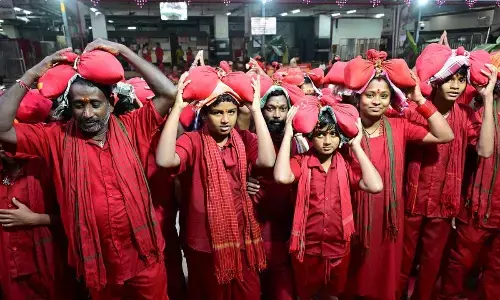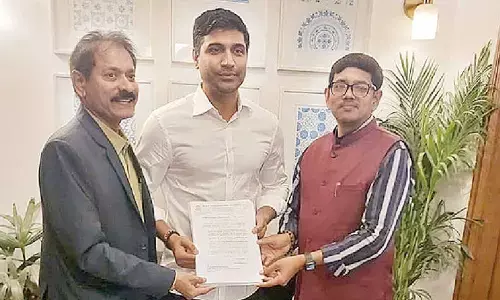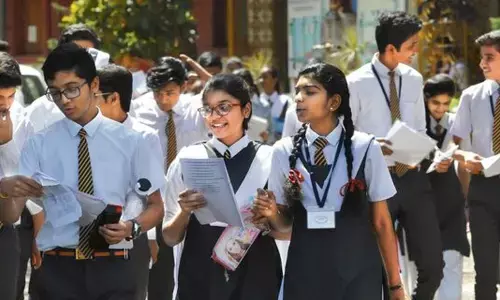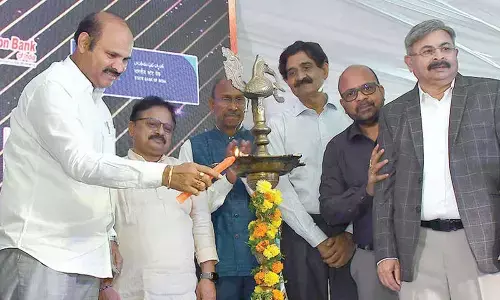Ring side view :Marking of a significant era

Manikonda Chalapathi Rau lived in an era when the editor called all the shots. His death saw the birth of a transition that set A off a reversal of roles in the media where the business and A advertisement departments began to erode the primacy of the editor 
 Thirty years ago on a cold March morning (25 March 1983) an elderly person collapsed before a tea bunk behind Pandara Road flats in Delhi. The bunk owner called the Tilak Marg police who came and took away the body. Prodded by a premonition the domestic help at the old man's house alerted employees of his former office. Soon they launched a search that ended at the morgue the next day. The elderly person was recognised as Manikonda Chalapathi Rau, MC in short, editor of the National Herald, 'the ablest journalist in India today,' as Jawaharlal Nehru once called him at a NH jubilee celebration. MC's memories at once summon the names of two great personalities, Jawaharlal Nehru and Kotamraju Rama Rao. A bachelor, Chalapathi Rau was married to his two loves, the English language and journalism. They were his appetiser and entrée at the same time. His reclusion, his integrity and learning and contempt for revenue-centred journalism explained why editors of his time had high regard for him. The National Herald was known as the voice of India during the freedom struggle. The British government banned it twice, once in 1942 and a second time in 1945. I had first met Chalapathi Rau, tall, shy and modest to the point of invisibility, in 1957 in the foyer of the Jubilee Hall in Hyderabad's Public Gardens. He had come to inaugurate the Andhra Pradesh chapter of the Indian Federation of Working Journalists. Two decades later I met him in his Bahadurshah Zafar Marg office in Delhi seeking a place in his paper. Years later, a couple of months before his death, my editor in Patriot asked me to meet Chalapathi Rau on a daily basis to help Patriot draft a synoptic sketch for a biography the newspaper had planned to publish as a tribute to its founder-editor E Narayanan, a close friend of Chalapathi Rau. On Narayanan's death he wrote, 'His words sizzled and burnt the paper on which he wrote them.' I called at his place in the Humayun Road flats and found the interior bare of any furniture to mention. He had few belongings, one of which was a two-in-one, a radio cum tape recorder, his constant companion at home. After books he loved music most. We discussed Carnatic music of which he was a great lover as he was of Andhra pickles. He had never told me he had refused to accept the Padma Bhushan award in 1969. Nor did he ever mention to me about his friendship with the Nehru family. One example of his Spartan-style living: When he was working for Hindustan times, its boss Devadas Gandhi offered him a tempting salary hike. He declined the offer saying, 'Devadasji, no, thanks. Don't spoil me.' He was known for his proximity to Nehru and his family and also for his love for the English language. Indira Gandhi said (on the occasion to mark 30 years of MC as editor of NH), 'My father not only had regard and unfailing trust in him but regarded him as a friend. My husband and I felt privileged to count him also a friend. The country thinks of the Herald as Jawaharlal Nehru's paper. But it is equally Chalapathi Rau's paper. Today, we are gathered here to honour a person who symbolises editorial integrity.' PD Tandon, also a friend of the Nehrus, said on the same occasion: 'I wondered what was in this journalist which impressed Nehru so much. I knew that off-and-on he used to invite Chalapathi Rau to Delhi, introduced him to world celebrities and discussed with him various national and international problems.' According to Shubhabrata Bhattacharya, a former editor of the weekly Sunday and later of Herald, 'Rau was close to the prime minister and accompanied him on most important foreign visits as a representative of the newspaper, but he didn't crave a government position or sinecure. He held no post in the party, nor did he push for a nomination to the Upper House like many editors today. ' There was criticism that his friendship with Nehru came in the way of Chalapathi Rau criticising his policies. The lateA P Tharayan, formerly of Hindustan Times and later an editor at the National Herald, wrote in his book Good News And Bad News that MC 'was a true Nehru devotee who would castigate Congress bigwigs but never did he write a line critical of Nehru or his daughter.' Wasn't it natural for a person who had spent nearly all his career years with the National Herald endorsing Nehru's policies? Despite his refusal to let the name of Sanjay Gandhi, who symbolised the Emergency aberration, appear in the news columns of the Herald, the word went round that he had soft-pedaled Indira Gandhi's emergency rule. Yes, his performance never matched the pusillanimity of media heroes who crawled when they were asked to bend, who gladly welcomed Indira Gandhi's nominee on their editorial board, who stood in a line before a petty PIB official waiting for his nod to publish the day's news. Anyway, the emergency never produced media heroes barring the lone warrior KR Malkani, editor of Motherland, who wrote an editorial on the day emergency, was declared and went to jail leading to the permanent closure of his paper. The rest of the editors produced self-adulatory media mythologies. The Herald founded by Jawaharlal Nehru in 1938 had two celebrated editors, Kotamraju Rama Rao and M Chalapathi Rau. Rama Rao and his deputy, Chalapathi Rau, together made a formidable force in unearthing British conspiracies to deny independence to India. But their partnership ended in 1946, when Chalapathi Rau took over the reins and remained at the helm for the next thirty years and more. A great lover of the English language, a passion with him since his Presidency College days at Madras (now Chennai), at one time he considered journalism several notches below literature. He had a longtime engagement with the English language and its nuances and melodies. His love of poetry often seeped into his prose. KR Srinivasa Iyengar, a former vice-chancellor of Andhra University and a longtime friend of Chalapathi Rau said, 'Chalapathi was a close student of modern English literature, especially poetry.' Former editor of The Illustrated Weekly of India AS Raman said, 'His Mere Gossip column in Hindustan Times (where he was an assistant editor before he joined the Herald) which he wrote every week under the pseudonym "Magnus" was the most widely read column in the country. I had known and admired him from a distance as an irresistible writer with a stunning mastery over stately and sensuous prose.' Chalapathi Rau lived in an era when the editor called all the shots. His death saw the birth of a transition that set off a reversal of roles in the media where the business and advertisement departments began to erode the primacy of the editor. Most lovable of editors that walked the media street, Khushwant Singh wrote in Outlook (24 Mar. 08): "The hard truth about Indian journalism today is that proprietors matter, editors do not; money counts, talent does not."
Thirty years ago on a cold March morning (25 March 1983) an elderly person collapsed before a tea bunk behind Pandara Road flats in Delhi. The bunk owner called the Tilak Marg police who came and took away the body. Prodded by a premonition the domestic help at the old man's house alerted employees of his former office. Soon they launched a search that ended at the morgue the next day. The elderly person was recognised as Manikonda Chalapathi Rau, MC in short, editor of the National Herald, 'the ablest journalist in India today,' as Jawaharlal Nehru once called him at a NH jubilee celebration. MC's memories at once summon the names of two great personalities, Jawaharlal Nehru and Kotamraju Rama Rao. A bachelor, Chalapathi Rau was married to his two loves, the English language and journalism. They were his appetiser and entrée at the same time. His reclusion, his integrity and learning and contempt for revenue-centred journalism explained why editors of his time had high regard for him. The National Herald was known as the voice of India during the freedom struggle. The British government banned it twice, once in 1942 and a second time in 1945. I had first met Chalapathi Rau, tall, shy and modest to the point of invisibility, in 1957 in the foyer of the Jubilee Hall in Hyderabad's Public Gardens. He had come to inaugurate the Andhra Pradesh chapter of the Indian Federation of Working Journalists. Two decades later I met him in his Bahadurshah Zafar Marg office in Delhi seeking a place in his paper. Years later, a couple of months before his death, my editor in Patriot asked me to meet Chalapathi Rau on a daily basis to help Patriot draft a synoptic sketch for a biography the newspaper had planned to publish as a tribute to its founder-editor E Narayanan, a close friend of Chalapathi Rau. On Narayanan's death he wrote, 'His words sizzled and burnt the paper on which he wrote them.' I called at his place in the Humayun Road flats and found the interior bare of any furniture to mention. He had few belongings, one of which was a two-in-one, a radio cum tape recorder, his constant companion at home. After books he loved music most. We discussed Carnatic music of which he was a great lover as he was of Andhra pickles. He had never told me he had refused to accept the Padma Bhushan award in 1969. Nor did he ever mention to me about his friendship with the Nehru family. One example of his Spartan-style living: When he was working for Hindustan times, its boss Devadas Gandhi offered him a tempting salary hike. He declined the offer saying, 'Devadasji, no, thanks. Don't spoil me.' He was known for his proximity to Nehru and his family and also for his love for the English language. Indira Gandhi said (on the occasion to mark 30 years of MC as editor of NH), 'My father not only had regard and unfailing trust in him but regarded him as a friend. My husband and I felt privileged to count him also a friend. The country thinks of the Herald as Jawaharlal Nehru's paper. But it is equally Chalapathi Rau's paper. Today, we are gathered here to honour a person who symbolises editorial integrity.' PD Tandon, also a friend of the Nehrus, said on the same occasion: 'I wondered what was in this journalist which impressed Nehru so much. I knew that off-and-on he used to invite Chalapathi Rau to Delhi, introduced him to world celebrities and discussed with him various national and international problems.' According to Shubhabrata Bhattacharya, a former editor of the weekly Sunday and later of Herald, 'Rau was close to the prime minister and accompanied him on most important foreign visits as a representative of the newspaper, but he didn't crave a government position or sinecure. He held no post in the party, nor did he push for a nomination to the Upper House like many editors today. ' There was criticism that his friendship with Nehru came in the way of Chalapathi Rau criticising his policies. The lateA P Tharayan, formerly of Hindustan Times and later an editor at the National Herald, wrote in his book Good News And Bad News that MC 'was a true Nehru devotee who would castigate Congress bigwigs but never did he write a line critical of Nehru or his daughter.' Wasn't it natural for a person who had spent nearly all his career years with the National Herald endorsing Nehru's policies? Despite his refusal to let the name of Sanjay Gandhi, who symbolised the Emergency aberration, appear in the news columns of the Herald, the word went round that he had soft-pedaled Indira Gandhi's emergency rule. Yes, his performance never matched the pusillanimity of media heroes who crawled when they were asked to bend, who gladly welcomed Indira Gandhi's nominee on their editorial board, who stood in a line before a petty PIB official waiting for his nod to publish the day's news. Anyway, the emergency never produced media heroes barring the lone warrior KR Malkani, editor of Motherland, who wrote an editorial on the day emergency, was declared and went to jail leading to the permanent closure of his paper. The rest of the editors produced self-adulatory media mythologies. The Herald founded by Jawaharlal Nehru in 1938 had two celebrated editors, Kotamraju Rama Rao and M Chalapathi Rau. Rama Rao and his deputy, Chalapathi Rau, together made a formidable force in unearthing British conspiracies to deny independence to India. But their partnership ended in 1946, when Chalapathi Rau took over the reins and remained at the helm for the next thirty years and more. A great lover of the English language, a passion with him since his Presidency College days at Madras (now Chennai), at one time he considered journalism several notches below literature. He had a longtime engagement with the English language and its nuances and melodies. His love of poetry often seeped into his prose. KR Srinivasa Iyengar, a former vice-chancellor of Andhra University and a longtime friend of Chalapathi Rau said, 'Chalapathi was a close student of modern English literature, especially poetry.' Former editor of The Illustrated Weekly of India AS Raman said, 'His Mere Gossip column in Hindustan Times (where he was an assistant editor before he joined the Herald) which he wrote every week under the pseudonym "Magnus" was the most widely read column in the country. I had known and admired him from a distance as an irresistible writer with a stunning mastery over stately and sensuous prose.' Chalapathi Rau lived in an era when the editor called all the shots. His death saw the birth of a transition that set off a reversal of roles in the media where the business and advertisement departments began to erode the primacy of the editor. Most lovable of editors that walked the media street, Khushwant Singh wrote in Outlook (24 Mar. 08): "The hard truth about Indian journalism today is that proprietors matter, editors do not; money counts, talent does not."

 Thirty years ago on a cold March morning (25 March 1983) an elderly person collapsed before a tea bunk behind Pandara Road flats in Delhi. The bunk owner called the Tilak Marg police who came and took away the body. Prodded by a premonition the domestic help at the old man's house alerted employees of his former office. Soon they launched a search that ended at the morgue the next day. The elderly person was recognised as Manikonda Chalapathi Rau, MC in short, editor of the National Herald, 'the ablest journalist in India today,' as Jawaharlal Nehru once called him at a NH jubilee celebration. MC's memories at once summon the names of two great personalities, Jawaharlal Nehru and Kotamraju Rama Rao. A bachelor, Chalapathi Rau was married to his two loves, the English language and journalism. They were his appetiser and entrée at the same time. His reclusion, his integrity and learning and contempt for revenue-centred journalism explained why editors of his time had high regard for him. The National Herald was known as the voice of India during the freedom struggle. The British government banned it twice, once in 1942 and a second time in 1945. I had first met Chalapathi Rau, tall, shy and modest to the point of invisibility, in 1957 in the foyer of the Jubilee Hall in Hyderabad's Public Gardens. He had come to inaugurate the Andhra Pradesh chapter of the Indian Federation of Working Journalists. Two decades later I met him in his Bahadurshah Zafar Marg office in Delhi seeking a place in his paper. Years later, a couple of months before his death, my editor in Patriot asked me to meet Chalapathi Rau on a daily basis to help Patriot draft a synoptic sketch for a biography the newspaper had planned to publish as a tribute to its founder-editor E Narayanan, a close friend of Chalapathi Rau. On Narayanan's death he wrote, 'His words sizzled and burnt the paper on which he wrote them.' I called at his place in the Humayun Road flats and found the interior bare of any furniture to mention. He had few belongings, one of which was a two-in-one, a radio cum tape recorder, his constant companion at home. After books he loved music most. We discussed Carnatic music of which he was a great lover as he was of Andhra pickles. He had never told me he had refused to accept the Padma Bhushan award in 1969. Nor did he ever mention to me about his friendship with the Nehru family. One example of his Spartan-style living: When he was working for Hindustan times, its boss Devadas Gandhi offered him a tempting salary hike. He declined the offer saying, 'Devadasji, no, thanks. Don't spoil me.' He was known for his proximity to Nehru and his family and also for his love for the English language. Indira Gandhi said (on the occasion to mark 30 years of MC as editor of NH), 'My father not only had regard and unfailing trust in him but regarded him as a friend. My husband and I felt privileged to count him also a friend. The country thinks of the Herald as Jawaharlal Nehru's paper. But it is equally Chalapathi Rau's paper. Today, we are gathered here to honour a person who symbolises editorial integrity.' PD Tandon, also a friend of the Nehrus, said on the same occasion: 'I wondered what was in this journalist which impressed Nehru so much. I knew that off-and-on he used to invite Chalapathi Rau to Delhi, introduced him to world celebrities and discussed with him various national and international problems.' According to Shubhabrata Bhattacharya, a former editor of the weekly Sunday and later of Herald, 'Rau was close to the prime minister and accompanied him on most important foreign visits as a representative of the newspaper, but he didn't crave a government position or sinecure. He held no post in the party, nor did he push for a nomination to the Upper House like many editors today. ' There was criticism that his friendship with Nehru came in the way of Chalapathi Rau criticising his policies. The lateA P Tharayan, formerly of Hindustan Times and later an editor at the National Herald, wrote in his book Good News And Bad News that MC 'was a true Nehru devotee who would castigate Congress bigwigs but never did he write a line critical of Nehru or his daughter.' Wasn't it natural for a person who had spent nearly all his career years with the National Herald endorsing Nehru's policies? Despite his refusal to let the name of Sanjay Gandhi, who symbolised the Emergency aberration, appear in the news columns of the Herald, the word went round that he had soft-pedaled Indira Gandhi's emergency rule. Yes, his performance never matched the pusillanimity of media heroes who crawled when they were asked to bend, who gladly welcomed Indira Gandhi's nominee on their editorial board, who stood in a line before a petty PIB official waiting for his nod to publish the day's news. Anyway, the emergency never produced media heroes barring the lone warrior KR Malkani, editor of Motherland, who wrote an editorial on the day emergency, was declared and went to jail leading to the permanent closure of his paper. The rest of the editors produced self-adulatory media mythologies. The Herald founded by Jawaharlal Nehru in 1938 had two celebrated editors, Kotamraju Rama Rao and M Chalapathi Rau. Rama Rao and his deputy, Chalapathi Rau, together made a formidable force in unearthing British conspiracies to deny independence to India. But their partnership ended in 1946, when Chalapathi Rau took over the reins and remained at the helm for the next thirty years and more. A great lover of the English language, a passion with him since his Presidency College days at Madras (now Chennai), at one time he considered journalism several notches below literature. He had a longtime engagement with the English language and its nuances and melodies. His love of poetry often seeped into his prose. KR Srinivasa Iyengar, a former vice-chancellor of Andhra University and a longtime friend of Chalapathi Rau said, 'Chalapathi was a close student of modern English literature, especially poetry.' Former editor of The Illustrated Weekly of India AS Raman said, 'His Mere Gossip column in Hindustan Times (where he was an assistant editor before he joined the Herald) which he wrote every week under the pseudonym "Magnus" was the most widely read column in the country. I had known and admired him from a distance as an irresistible writer with a stunning mastery over stately and sensuous prose.' Chalapathi Rau lived in an era when the editor called all the shots. His death saw the birth of a transition that set off a reversal of roles in the media where the business and advertisement departments began to erode the primacy of the editor. Most lovable of editors that walked the media street, Khushwant Singh wrote in Outlook (24 Mar. 08): "The hard truth about Indian journalism today is that proprietors matter, editors do not; money counts, talent does not."
Thirty years ago on a cold March morning (25 March 1983) an elderly person collapsed before a tea bunk behind Pandara Road flats in Delhi. The bunk owner called the Tilak Marg police who came and took away the body. Prodded by a premonition the domestic help at the old man's house alerted employees of his former office. Soon they launched a search that ended at the morgue the next day. The elderly person was recognised as Manikonda Chalapathi Rau, MC in short, editor of the National Herald, 'the ablest journalist in India today,' as Jawaharlal Nehru once called him at a NH jubilee celebration. MC's memories at once summon the names of two great personalities, Jawaharlal Nehru and Kotamraju Rama Rao. A bachelor, Chalapathi Rau was married to his two loves, the English language and journalism. They were his appetiser and entrée at the same time. His reclusion, his integrity and learning and contempt for revenue-centred journalism explained why editors of his time had high regard for him. The National Herald was known as the voice of India during the freedom struggle. The British government banned it twice, once in 1942 and a second time in 1945. I had first met Chalapathi Rau, tall, shy and modest to the point of invisibility, in 1957 in the foyer of the Jubilee Hall in Hyderabad's Public Gardens. He had come to inaugurate the Andhra Pradesh chapter of the Indian Federation of Working Journalists. Two decades later I met him in his Bahadurshah Zafar Marg office in Delhi seeking a place in his paper. Years later, a couple of months before his death, my editor in Patriot asked me to meet Chalapathi Rau on a daily basis to help Patriot draft a synoptic sketch for a biography the newspaper had planned to publish as a tribute to its founder-editor E Narayanan, a close friend of Chalapathi Rau. On Narayanan's death he wrote, 'His words sizzled and burnt the paper on which he wrote them.' I called at his place in the Humayun Road flats and found the interior bare of any furniture to mention. He had few belongings, one of which was a two-in-one, a radio cum tape recorder, his constant companion at home. After books he loved music most. We discussed Carnatic music of which he was a great lover as he was of Andhra pickles. He had never told me he had refused to accept the Padma Bhushan award in 1969. Nor did he ever mention to me about his friendship with the Nehru family. One example of his Spartan-style living: When he was working for Hindustan times, its boss Devadas Gandhi offered him a tempting salary hike. He declined the offer saying, 'Devadasji, no, thanks. Don't spoil me.' He was known for his proximity to Nehru and his family and also for his love for the English language. Indira Gandhi said (on the occasion to mark 30 years of MC as editor of NH), 'My father not only had regard and unfailing trust in him but regarded him as a friend. My husband and I felt privileged to count him also a friend. The country thinks of the Herald as Jawaharlal Nehru's paper. But it is equally Chalapathi Rau's paper. Today, we are gathered here to honour a person who symbolises editorial integrity.' PD Tandon, also a friend of the Nehrus, said on the same occasion: 'I wondered what was in this journalist which impressed Nehru so much. I knew that off-and-on he used to invite Chalapathi Rau to Delhi, introduced him to world celebrities and discussed with him various national and international problems.' According to Shubhabrata Bhattacharya, a former editor of the weekly Sunday and later of Herald, 'Rau was close to the prime minister and accompanied him on most important foreign visits as a representative of the newspaper, but he didn't crave a government position or sinecure. He held no post in the party, nor did he push for a nomination to the Upper House like many editors today. ' There was criticism that his friendship with Nehru came in the way of Chalapathi Rau criticising his policies. The lateA P Tharayan, formerly of Hindustan Times and later an editor at the National Herald, wrote in his book Good News And Bad News that MC 'was a true Nehru devotee who would castigate Congress bigwigs but never did he write a line critical of Nehru or his daughter.' Wasn't it natural for a person who had spent nearly all his career years with the National Herald endorsing Nehru's policies? Despite his refusal to let the name of Sanjay Gandhi, who symbolised the Emergency aberration, appear in the news columns of the Herald, the word went round that he had soft-pedaled Indira Gandhi's emergency rule. Yes, his performance never matched the pusillanimity of media heroes who crawled when they were asked to bend, who gladly welcomed Indira Gandhi's nominee on their editorial board, who stood in a line before a petty PIB official waiting for his nod to publish the day's news. Anyway, the emergency never produced media heroes barring the lone warrior KR Malkani, editor of Motherland, who wrote an editorial on the day emergency, was declared and went to jail leading to the permanent closure of his paper. The rest of the editors produced self-adulatory media mythologies. The Herald founded by Jawaharlal Nehru in 1938 had two celebrated editors, Kotamraju Rama Rao and M Chalapathi Rau. Rama Rao and his deputy, Chalapathi Rau, together made a formidable force in unearthing British conspiracies to deny independence to India. But their partnership ended in 1946, when Chalapathi Rau took over the reins and remained at the helm for the next thirty years and more. A great lover of the English language, a passion with him since his Presidency College days at Madras (now Chennai), at one time he considered journalism several notches below literature. He had a longtime engagement with the English language and its nuances and melodies. His love of poetry often seeped into his prose. KR Srinivasa Iyengar, a former vice-chancellor of Andhra University and a longtime friend of Chalapathi Rau said, 'Chalapathi was a close student of modern English literature, especially poetry.' Former editor of The Illustrated Weekly of India AS Raman said, 'His Mere Gossip column in Hindustan Times (where he was an assistant editor before he joined the Herald) which he wrote every week under the pseudonym "Magnus" was the most widely read column in the country. I had known and admired him from a distance as an irresistible writer with a stunning mastery over stately and sensuous prose.' Chalapathi Rau lived in an era when the editor called all the shots. His death saw the birth of a transition that set off a reversal of roles in the media where the business and advertisement departments began to erode the primacy of the editor. Most lovable of editors that walked the media street, Khushwant Singh wrote in Outlook (24 Mar. 08): "The hard truth about Indian journalism today is that proprietors matter, editors do not; money counts, talent does not." (The writer is a senior Indian journalist who now lives in the US [email protected])
Next Story














